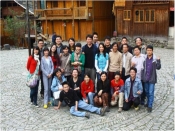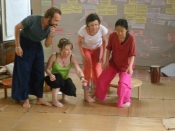By Wang Xiaobo (Programme Consultant, Yunnan Office, PCD)
 How did it all come about?
How did it all come about?
I have always considered myself lucky. If it were not for the fact that my colleagues were busy, I would not have taken part in the training course on Ecovillage Design Education (EDE) which changed my life.
There was another reason that I wanted to take part in the training. When a friend who had taken part in the EDE training in Thailand described his experience to us, the content of EDE seemed so “enigmatic”. To use an iron nail to find the best location to build a house—such an idea was inconceivable and very intriguing for me. Since I am a curious person, I decided to attend the EDE training held by PCD in Guizhou in 2010-2011 and the EDE course and trainers’ training in Thailand later.
The enigma changed my understanding about the world.
A New World View
The activity that left the deepest impression on me was “Dream of Growing Bean Sprouts”* Since I grew up in the city, I had never grown anything on my own before. On the first day, we washed the green soybeans and put them in lunch boxes. We had to check the soybeans every day and draw them. I became attached to them. When I saw some soybeans were rotting, I was worried and wanted to eliminate the causes. When I saw them sprouting and growing, I was very happy. In tending to my bean sprouts and observing their changes, a kind of connection slowly grew between me and the soybeans. I began to feel that every soybean had life and the way each soybean grew was different. The sprouts would respond differently to different people. I felt that soybeans were not only our food. They were actually individuals each of which has a life and even character of its own. I even wondered how they saw me. I think if I had not gone through this whole process myself, and if I had not paid close attention when I observed them, I would never have developed this kind of emotional connection with the soybeans.
Because of this process, I have truly gained the consciousness (instead of having learnt only in my head) that all living things have souls and we and all creatures in nature are equal. Though we occupy this world in different forms and shapes, every living thing lives, breathes, has consciousness and feelings and has a character as well. I feel that each soybean is governed by the same natural laws that govern me—being born, growing old, getting sick and dying. This is the way we live in nature. The soybeans are different from me in that they speak a different language, and have a different way of feeling and thinking which we cannot grasp by using our logic or thought. They are therefore beyond our understanding. When I realised this fact, I gained a better sense of what it meant to be part of a whole. I understood “all things were interconnected” and that the pain of other living things and the pain of others were also my pain.
EDE is a window for me to gain new knowledge about this world. I remember when I took part in the training in Thailand, it was the first time I learnt of quantum physics. Since the facilitator spoke in English, I did not quite understand his explanation about this subject. I looked up on the internet and learnt that quantum physics, and the world it describes, is very different from conventional physics. It turns out that even in the minuscule world of particles, nothing is permanent or constant. Moreover, according to the theory of a holographic universe, all things are interconnected. This kind of scientific knowledge seems to echo Buddhist teachings that the world as we know it is an illusion; that the world is really a whole in which all things are interconnected. In fact, much of the ultimate essence of the real world is yet to be understood by science.
I felt as if I was like a frog in the well in terms of my knowledge of the world. “The Dao that can be described is not the eternal Dao; a name that can be named is not an everlasting name,” The Book of Dao says. “It cannot be expressed,” Buddha says. In the face of Nature, human beings are so small. There is still so much that we do not know. Looking back on the history of human beings, those periods of history when it was believed that human beings would triumph over Nature now seem so laughable and pathetic. Yet even now there are people who believe that new miracles can be created by advanced technology. I began to read The Book of Dao and some Buddhist texts in a serious manner after I took part in the EDE training. Gradually I learnt to leave behind my ego and to be more humble. Sometimes I have doubts: if I leave behind my ego, does it mean that I have no more self? Is this the way to love oneself? I think it is not possible to have a clear answer now. Perhaps only when I have practiced and experienced more will the answer slowly appear.
Wisdom from Learning, Thinking and Practising
During the EDE training in Thailand, our teacher Pracha said that there were two kinds of knowledge—the knowledge that assembles and the knowledge that disperses. In other words, there is a kind of knowledge that can be transmitted by words and this is the kind of knowledge that we learn in schools and which can be expressed precisely. However, a large part of knowledge (or wisdom) cannot be expressed in words, such as team spirit and leadership, and so forth. This kind of wisdom cannot be gained by listening or thinking but only by experiencing. This is similar to the three kinds of wisdom described in Buddhism: wisdom from learning, thinking and practising. The wisdom that we gain from practicing belongs to a higher level than the wisdom we gain from learning and thinking because it is what you have gone through and what you have felt. It is therefore your own experience and will become a kind of wisdom that is part of your inner and spiritual being. The purpose of the EDE course is to help us transform ideas and concepts and turn them into our own wisdom by enabling us to gain and to summarise our own experience.
I still remember the game of “Moon Ball” that we played for over six hours. In the game we experienced the importance of trust and complementarity in team collaboration and learnt that the process was more important than the result. We also learnt to forgive others’ mistakes and to accept our own shortcomings. I remember also the game, “Searching for the Way Home” which we played in Guizhou. We learnt that there were many types of leadership, and every one of us could become leaders while there was a kind of balance between taking the lead and participating. And I remember the “Money Game”, through which one learns how easily a competitive mentality may grow, how different expressions of human nature may be triggered by different systems of economic and social organisation, and how one may easily be trapped by the system under which one lives. There are many such games and experiences in EDE training, and I have gained insights from each game and each activity which have increased my own self-knowledge.
The Dream of Ecovillage
After I took part in the EDE course in Guizhou, someone asked me: “What is your biggest dream?” At that time my answer was to travel around the world. Since I attended the EDE trainers’ training, I have conceived a new dream. I wish to take part directly in the building of an ecovillage which is also an educational base. This idea has become firmer and clearer with every passing day.
I used to have doubts about utopia because I believed that where there were people, there were disputes and conflicts. There is a Hollywood movie, “The Beach” which is about a group of Europeans and Americans living a serene life on a remote and beautiful island in Thailand. In the end of the story, the heavenly peace of the life on the island was dashed due to suspicions and jealousy as well as misunderstanding and distrust among the inhabitants. However, Thich Nhat Han once said: “The next Buddha will not appear as a person… s/he may appear as a community.” His words touched me deeply. They convinced me that so long as each of us remain humble and loving, such a community can be built.
I also believe that if we want more people to believe that the ecovillage approach is feasible and that there are alternatives to mainstream values and lifestyles, we must live out these ideas and lifestyles, just as the Yamagishi Association is doing. However, I know that there is still a lot to be learnt if I want to build an ecovillage. Taking part in the EDE training is only a start. There is a long road ahead and I need to continue to learn through practice. It seems to me that I have more fellow-travellers now, and this makes me happy. Perhaps in the mind of every person there is the seed of an ecovillage and it will sprout when there is the right soil, sunlight and water.



